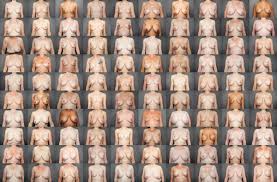bare
英 [beər]
美 [ber]
- adj. 空的;赤裸的,无遮蔽的
- vt. 露出,使赤裸
- n. (Bare)人名;(英)贝尔
使用频率:

记忆方法
1. ba(爸爸) + re(热) => 爸爸热了,就会脱掉衣服赤条条地去冲澡、冲凉。
2. 谐音“白(四川方言发音:be)哦、白(四川方言发音:be)儿、扒了”。
2. 谐音“白(四川方言发音:be)哦、白(四川方言发音:be)儿、扒了”。
中文词源
bare 赤裸的
来自PIE *bhosos, 裸露的,纯粹的。
英语词源
- bare
-
bare: [OE] Bare is an ancient word, traceable back to an Indo-European *bhosos. Descendants of this in non-Germanic languages include Lithuanian basas ‘barefoot’, but for the most part it is the Germanic languages that have adopted the word. Germanic *bazaz produced German and Swedish bar, Dutch baar, and, via Old English bær, modern English bare.
- bare (v.)
- Old English barian, from bare (adj.). Related: Bared; baring.
- bare (adj.)
- Old English bær "naked, uncovered, unclothed," from Proto-Germanic *bazaz (cognates: German bar, Old Norse berr, Dutch baar), from PIE *bhosos (cognates: Armenian bok "naked;" Old Church Slavonic bosu, Lithuanian basas "barefoot"). Meaning "sheer, absolute" (c. 1200) is from the notion of "complete in itself."
权威例句
- 1. They would have liked bare wooden floors throughout the house.
- 他们本想在整个房间的木地板上都不铺地毯的。
- 2. The room remains simple with bare, stippled green walls.
- 房间仍然很简朴,四面都是饰有圆点的绿色空墙。
- 3. The massacre laid bare the moral bankruptcy of the regime.
- 大屠杀使该政权的道德沦丧暴露无遗。
- 4. Police believe the killer punched her to death with his bare hands.
- 警方认为她是被凶手活活用拳头打死的。
- 5. Their room was bare of furniture and they lived off porridge.
- 他们家徒四壁,靠喝粥度日。
